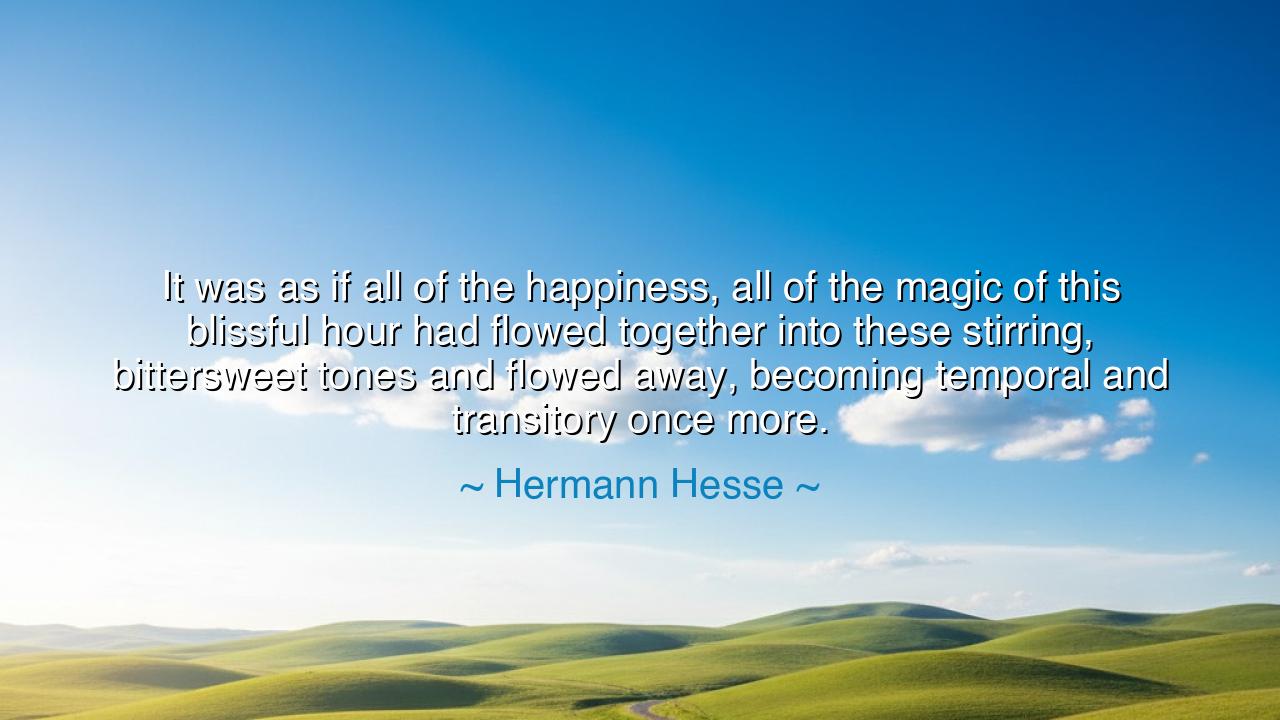
It was as if all of the happiness, all of the magic of this
It was as if all of the happiness, all of the magic of this blissful hour had flowed together into these stirring, bittersweet tones and flowed away, becoming temporal and transitory once more.






The mystic poet and philosopher Hermann Hesse, master of the soul’s journey, once wrote: “It was as if all of the happiness, all of the magic of this blissful hour had flowed together into these stirring, bittersweet tones and flowed away, becoming temporal and transitory once more.” In these words, Hesse captures one of the most profound truths of human existence — that joy, however radiant, is fleeting, and that all beauty in this world is bound by the rhythm of time. Yet within that transience lies the very heart of meaning. For the ancient wisdom of life is not in resisting impermanence, but in embracing it — to love the moment not because it lasts, but because it passes.
The origin of this reflection comes from Hesse’s lifelong meditation on the dualities of being: spirit and body, permanence and decay, rapture and sorrow. As a writer who lived through both world wars, Hesse saw how quickly life’s splendor could dissolve into dust, how even the most exquisite joy carries within it the seed of its own ending. His words are likely inspired by moments of music, that art form most akin to life itself — born, it seems, from eternity, only to vanish into silence. In that vanishing, he perceived a mirror of the human heart: every song, like every life, glows with emotion, trembles with beauty, and fades, leaving behind the ache of memory and the whisper of what once was.
When Hesse speaks of “stirring, bittersweet tones,” he reveals the paradox of joy — that happiness and sorrow are not opposites, but companions. True bliss, he suggests, always holds a trace of sadness, because deep down we know it cannot remain. The laughter of a child, the light of a sunset, the embrace of a beloved — these are not diminished by their brevity; rather, they are made sacred by it. To feel deeply, knowing it will not last, is the highest courage of the heart. For only those who have accepted the transience of life can experience its beauty in full.
This truth was known even to the ancients. The Greek philosophers spoke of kairos — the divine moment, the sacred now. To them, it was not the endless flow of time that mattered, but the instant when the soul becomes awake to life’s essence. The Japanese, too, call this sense mono no aware — the gentle sorrow of things, the awareness that all beauty is transient. One might recall the poet Bashō, who wrote of cherry blossoms falling in spring: “Even in Kyoto, hearing the cuckoo’s cry, I long for Kyoto.” The moment itself is perfect, yet already slipping away. Hesse’s words, too, are an echo of that longing — the desire to hold on to something that by nature cannot be held.
In our own age, we see this reflected in the life of Anne Frank, who, even amid the horrors of confinement, found brief flashes of beauty — the patch of blue sky outside her window, the laughter of her sister, the small acts of kindness that defied despair. She wrote, “I don’t think of all the misery, but of the beauty that still remains.” Like Hesse’s “blissful hour,” her happiness was fragile, fleeting — yet its glow endures through her words. Her courage teaches that even in the shadow of loss, we must open ourselves to the wonder of the moment, for that is where the soul truly lives.
Hesse’s teaching is both tender and piercing: that happiness is not meant to be permanent. To demand permanence of joy is to destroy its nature. Instead, one must learn to flow with life, as the river flows toward the sea — never clinging, never resisting, yet always alive. When we accept that every experience, no matter how beautiful, will fade, we begin to live with gratitude instead of greed, with presence instead of fear. The magic of the moment becomes enough. We cease trying to own happiness, and instead become its vessel.
Let every seeker, then, take this wisdom to heart: do not mourn the passing of joy, but honor its presence. When you feel happiness, let it fill you completely; when it leaves, let it depart with grace. Remember that every ending makes way for another beginning, that the music of life continues even after each note fades. As Hesse knew, the sweetest melodies are not those that linger, but those that teach the heart how to listen — to time, to loss, to love.
Thus, the lesson is clear: to live fully, you must learn to let go. Each blissful hour, like the tones of a vanished song, flows away into memory, but it leaves behind a trace of the eternal. Treasure these moments not as possessions, but as gifts. Let their passing remind you of your own impermanence, and let that awareness awaken reverence in your soul. For in the end, as Hermann Hesse teaches, life’s magic lies not in its permanence, but in its beautiful, shimmering impermanence — in the music that rises, trembles, and fades, yet never truly dies.






AAdministratorAdministrator
Welcome, honored guests. Please leave a comment, we will respond soon